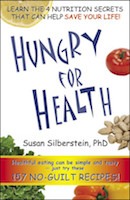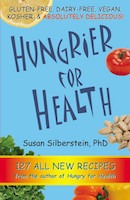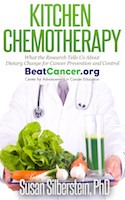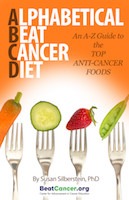Can Strawberries Prevent Cancer?
December 20, 2013 | Author: Susan Silberstein PhDWhen it comes to preventing cancer, can strawberries really make a difference? Absolutely! Strawberries can affect risk for several different cancers in several different ways. They can even help reverse cancer growth. The research is impressive, but make sure you get the right amount and the right kind.
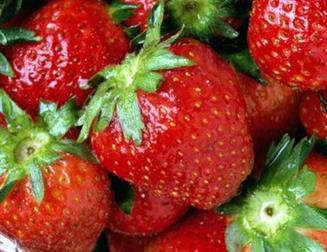 When it comes to preventing cancer, can strawberries really make a difference? Absolutely! Strawberries can affect risk for several different cancers in several different ways. They can even help reverse cancer growth. The research is impressive, but make sure you get the right amount and the right kind.
When it comes to preventing cancer, can strawberries really make a difference? Absolutely! Strawberries can affect risk for several different cancers in several different ways. They can even help reverse cancer growth. The research is impressive, but make sure you get the right amount and the right kind.
Strawberries are high in antioxidants, which mop up free radicals that lead to cancer. They are also high in fiber in both their flesh and seeds, and fiber can help bind up and escort out toxins that contribute to cancer. Strawberries are packed with cancer-protective vitamin C as well as a wide range of other phytonutrients, flavonoids and polyphenols like quercetin and ellagic acid.
Ellagic acid utilizes several different cancer-fighting methods, acting as an antioxidant, helping to deactivate specific carcinogens, and slowing the reproduction of cancer cells. Ellagic acid is also a potent anti-angiogenetic factor, which can slow the growth of blood vessels that feed new tumor cells. In laboratory studies, ellagic acid has demonstrated the ability to prevent cancers of the skin, bladder, lung, esophagus and breast.
Quercetin, found in abundance in strawberries, can induce apoptosis, programmed self-destruction of cancer cells. In a study published in the Journal of Agriculture and Food Chemistry, quercetin and whole strawberry extract inhibited the proliferation of human liver cancer cells, produced a dramatic increase in cell death (up to 80 percent) after only 18 hours of treatment and retarded the proliferation of these cells prior to their death. Thus, strawberries and their major phytonutrient, quercetin, may have protective actions at several steps in the cancer process.
Among Chinese participants at high risk of developing esophageal cancer, eating strawberries helped prevent early lesions from developing into tumors, according to Tong Chen, MD, PhD, a cancer researcher at Ohio State Comprehensive Cancer Center. The 36 volunteers with precancerous changes consumed a daily freeze-dried strawberry powder drink, the equivalent of two ounces of strawberries a day. After six months, 29 of the 36 participants (80%) experienced a decreased level of precancerous lesions, most of which either regressed from moderate to mild or disappeared completely; half of those on the high dose strawberries were disease free.
It is absolutely crucial to consume only organic strawberries. A recent report from the U.S. Department of Agriculture found that a single sample of strawberries contained 13 different pesticides, and a Pesticide Action Network analysis found 54 different pesticides among strawberry samples, including nine probable carcinogens, 24 suspected hormone disruptors, 11 neurotoxins and 12 reproductive toxins.
This may be one reason that organic strawberries seem to have more cancer-fighting ability than non-organic berries. Researchers at the Swedish University of Agricultural Sciences compared extracts of five organic and conventional crops for their ability to inhibit the proliferation of human colon and breast cancer cells. They found that extracts from organically grown strawberries interfered with cancer cell division and inhibited cell proliferation more effectively than extracts from conventionally grown berries. At the highest concentration, the organic extracts inhibited proliferation of colon cancer cells by 60% and breast cancer cells by 53%; the corresponding values for conventional strawberry extracts were 49.7 percent and 37.9 percent respectively.
Another reason to eat organic strawberries is that their phytonutrient content is higher than in conventionally grown strawberries, especially vitamin C. Compost as a soil supplement increases the level of antioxidant compounds in strawberries. In the Swedish research mentioned above, the most effective extracts at inhibiting cell proliferation contained 48 percent more ascorbate and five times more dehydroascorbate. (Vitamin C is ascorbate plus dehydroascorbate.) The organic strawberries had more antioxidants and a higher ratio of ascorbate to dehydroascorbate.
So do your best to eat a half cup of organic strawberries every day – whole, in a smoothie or as cold soup. If you can’t find or afford fresh organic strawberries, check if your local market carries the frozen berries, and if not, ask if they can order them.
Join the conversation: Ask Holistic Cancer Coach Facebook Group
References:
[1] http://www.aicr.org/foods-that-fight-cancer/foodsthatfightcancer_berries.html
[2] http://healthland.time.com/2011/04/06/can-eating-strawberries-prevent-cancer/
[3] http://www.care2.com/greenliving/strawberries-can-reverse-precancerous-progression.html
[4] http://www.webmd.com/cancer/news/20110406/strawberries-may-help-prevent-esophageal-cancer
[5] http://www.news-medical.net/news/2005/03/23/8674.aspx
[6] http://www.i-sis.org.uk/OSSCC.php
[7] http://www.prevention.com/food/healthy-eating-tips/strawberries-contain-large-amounts-chemicals-and-pesticides

